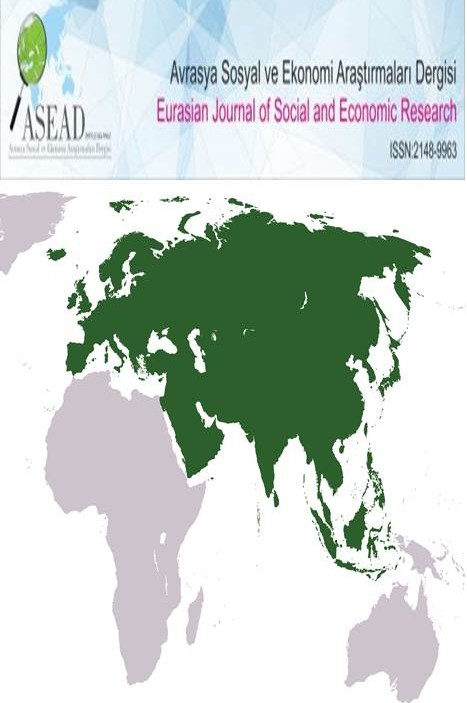SEÇİLMİŞ YÜKSEK GELİRLİ ÜLKELERDE EKONOMİK BÜYÜMENİN VE BEŞERİ SERMAYENİN CO2 EMİSYONLARINA ETKİLERİ
Bu çalışma, seçilen sekiz yüksek gelirli ülkede ekonomik büyümenin (GSYİH) ve insan sermayesinin CO2 emisyonları (CO2) üzerindeki etkilerini araştırmaya çalışmaktadır. Bu ülkeler Avustralya, Japonya, Kore Cumhuriyeti, Lüksemburg, Yeni Zelanda, Singapur, Birleşik Krallık ve ABD'DİR. Çalışmayı yapmak için 1990-2020 dönemi için yıllık bir panel ekonomik modeli kullanılmıştır. Kesitsel bağımlılık (CD) testleri ve CADF ve CIPS birim kök testleri, değişkenlerin kesitsel olarak bağımlı olduğunu ve aynı zamanda ilk farklılıklarda durağan olduğunu ortaya koymuştur. Kao ve Johansen Fisher Panel Eşbütünleşme Testleri değişkenler arasındaki eşbütünleşmeyi doğruladı. Havuzlanmış Tamamen Değiştirilmiş OLS (FMOLS) sonuçları, CO2 emisyonları ile ekonomik büyüme arasında ters U şeklinde bir ilişki olduğunu gösterdi; bu, modelde Çevresel Kuznets Eğrisi (EKC) hipotezinin var olduğunu ima ediyor. Ayrıca, bu Birleştirilmiş FMOLS test sonuçları, insan sermayesinin uzun vadede CO2 emisyonlarını azaltarak çevre kalitesini artırdığını da göstermiştir. VECM Granger nedensellik sonuçları, CO2 emisyonlarından ekonomik büyümeye ve ekonomik büyümeden beşeri sermayeye kadar kısa vadeli tek yönlü nedenselliği ve CO2 emisyonları ile ekonomik büyüme arasındaki uzun vadeli çift yönlü nedenselliği ortaya koymuştur. Çalışma, bu çalışmadan elde edilen bulgulara dayanarak gelecekteki çalışmalar için önerilerde bulunarak tamamlanmıştır.
Anahtar Kelimeler:
CO2 emisyonları, Ekonomik Büyüme, beşeri sermaye, Panel Veri Analizi, Çevresel Kuznets Eğrisi (EKC) Hipotezi, Kao Panel Eşbütünleşme Testi, Johansen Fisher Panel Eşbütünleşme Testi, Panel FMOLS Uzun Vadeli Tahmin Testi, VECM Granger Nedensellik Testi.
EFFECTS OF ECONOMIC GROWTH AND HUMAN CAPITAL ON CO2 EMISSIONS IN SELECTED HIGH-INCOME COUNTRIES: PANEL ECONOMETRIC ANALYSIS
This study attempts to investigate the effects of economic growth (GDP) and Human capital (HDI) on CO2 emissions (CO2) in selected eight high income countries. These countries are Australia, Japan, Republic of Korea, Luxembourg, New Zealand, Singapore, the United Kingdom and the United States. To do the study, an annual panel economic model was used for the period 1990-2020. The cross-sectional dependence (CD) tests and CADF and CIPS unit root tests revealed that the variables are cross-sectionally dependent and also stationary at the first differences. The Kao and Johansen Fisher Panel Cointegration Tests confirmed the cointegration among the variables. The Pooled Fully Modified OLS (FMOLS) results showed an inverted U-shaped relationship between CO2 emissions and economic growth which implies that there exists the Environmental Kuznets Curve (EKC) hypothesis in the model. Furthermore, this Pooled FMOLS test results also showed that human capital improves environmental quality by reducing CO2 emissions in the long-run. The VECM Granger causality results revealed the short-run unidirectional causality from CO2 emissions to economic growth and from economic growth to human capital, and the long-run bidirectional causality between CO2 emissions and economic growth. The study finished by providing recommendations for future studies based on the findings obtained from this study.
Keywords:
CO2 emissions, Economic Growth, Human Capital, Panel Data Analysis, Environmental Kuznets Curve (EKC) Hypothesis, Kao Panel Cointegration Test, Johansen Fisher Panel Cointegration Test, Panel FMOLS Long-run Estimation Test, VECM Granger Causality Test.,
___
- Ahmed, Z., Nathaniel, S. P. and Shahbaz, M. (2021). The criticality of information and communication technology and human capital in environmental sustainability: Evidence from Latin American and Caribbean countries. Journal of Cleaner Production, 286, 125529.
- Baltagi, B.H. (2005). Econometric Analysis of Panel Data. 3rd Edition, John Wiley & Sons Inc., New York.
- Çakar, N. D., Gedikli, A., Erdoğan, S. and Yıldırım, D. Ç. (2021). Exploring the nexus between human capital and environmental degradation: The case of EU countries. Journal of Environmental Management, 295, 113057.
- Haini, H. (2021). Examining the impact of ICT, human capital and carbon emissions: Evidence from the ASEAN economies. International Economics, 166, 116–125.
- Hao, L., Umar, M., Khan, Z. and Ali, W. (2021). Green growth and low carbon emission in G7 countries: How critical the network of environmental taxes, renewable energy and human capital is? Science of the Total Environment, 752, 141853.
- Kao, C. (1999). Spurious regression and residual-based tests for cointegration in panel data. Journal of Econometrics, 90 (1), 1-44.
- Khan, Z, Ali, S., Dong, K. and Man Li, R. (2021). How does fiscal decentralization affect CO2 emissions? The roles of institutions and human capital. Energy Economics, 94, 105060.
- Maddala, G. S. and Wu, S. (1999). A Comparative Study of Unit Root Tests with Panel Data and a New Simple Test. Oxford Bulletin of Economics and Statistics, 61 (S1), 631-652.
- Opoku, E. E. O., Dogah, K. E., Aluko, O. A. (2022). The contribution of human development towards environmental sustainability. Energy Economics, 106, 105782.
- Pesaran, M. H. (2007). A simple panel unit root test in the presence of cross-section dependence. Journal of Applied Econometrics, 22, 265–312.
- Rahman, M. M., Nepal, R. and Alam, K. (2021). Impacts of human capital, exports, economic growth and energy consumption on CO2 emissions of a cross-sectionally dependent panel: Evidence from the newly industrialized countries (NICs). Environmental Science and Policy, 121, 24–36.
- Stern, D. I. (2004). The rise and fall of the Environment Kuznets Curve. Rensselaer Polytechnic Institute, Troy, NY, USA. doi:10.1016/j.worlddev.2004.03.004
- Yao, Y., Ivanovski, K., Inekwe, J. and Smyth, R. (2020). Human capital and CO2 emissions in the long run. Energy Economics, 91, 104907.
- Yayın Aralığı: Yılda 4 Sayı
- Başlangıç: 2014
- Yayıncı: İrfan TÜRKOĞLU
Sayıdaki Diğer Makaleler
Maysoon Ahmed Ahmed ALSUNAIDAR
DİJİTAL İLETİŞİM ARAÇLARI KULLANILARAK YAPILAN ARABULUCULUK GÖRÜŞMELERİNİN AVANTAJ VE DEZAVANTAJLARI
Mustafa FİDAN, Ensar LOKMANOGLU
ÖRGÜT KÜLTÜRÜNÜN KADIN ÇALIŞANLARIN ÖRGÜTSEL BAĞLILIĞINA VE PERFORMANSINA ETKİSİ
Mukaddes GÜLER, Gülten GÜMÜŞTEKİN
SURİYE GÖÇÜNÜN TÜRKİYE’NİN KENTLEŞME SÜREÇLERİNE ETKİLERİ: GAZİANTEP KENTİ ÖRNEĞİ
OKUMA AKICILIĞI VE ANLAMA BECERİLERİNİN GELİŞTİRİLMESİNDE OKUMA STRATEJİLERİ VE YÖNTEMLER
Öznur DİNÇEL, Reşat ÇETİN, Selda BERKER
TÜRKİYE’NİN DIŞ BORÇLARININ SÜRDÜRÜLEBİLİRLİĞİ
Yemen’deki İş ve Küçük ve Orta Boy İşletmeler Geliştirme Merkezleri Gerçekler ve Mevcut Zorluklar
